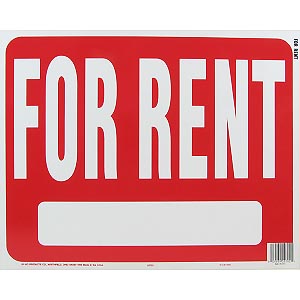 The autumn winds are descending on New York City, which can only mean one thing--there’s a storm coming. Fall is a banner season for the Manhattan rental market, and projections for the final three months of 2012 look to heighten this precedent. Rental prices hit a record high in July, totalling about $3,459 per month. That’s an astounding sum to pay for a single apartment. Before you head out to the nearest agency, be prepared to encounter stricter lease requirements. Now that the market is on fire, landlords are allowed to demand the very best of their tenants.
The autumn winds are descending on New York City, which can only mean one thing--there’s a storm coming. Fall is a banner season for the Manhattan rental market, and projections for the final three months of 2012 look to heighten this precedent. Rental prices hit a record high in July, totalling about $3,459 per month. That’s an astounding sum to pay for a single apartment. Before you head out to the nearest agency, be prepared to encounter stricter lease requirements. Now that the market is on fire, landlords are allowed to demand the very best of their tenants.
According to The Real Deal, landlords are finding ways to capitalize on the booming rental market. In addition to charging larger rents, landlords are unloading addendums (also known as riders) onto standard lease contracts in an effort to alter a client’s living situation to suit a their personal preference. These addendums can also be used to single out certain tenants and prohibit them from doing anything the landlords deem undesirable such as owning pets. Banning pets from the property is a commonplace practice that many landlords are adopting. This varies from lease to lease of course. Some landlords allow renters to have pets on property only if they provide proof that their pets are well trained. In this case, tenants often have to pay an additional security deposit.
Prior experiences also drive landlords to tailor their leases. The founder of Rapid Realty in Brooklyn, Anthony Lolli, spoke to The Real Deal about the stipulations he puts in his leases--including a clause which forbids the use of candles and smoking in his apartments. This was brought on by a fire that broke out on one of his properties a few years back. Other riders have stipulations regarding mold and bike storage. Harold Kobner, a rental broker for the Manhattan based Argo Residential, uses addendums to transfer the responsibility of maintaining his apartment’s 700 square foot terrace onto the tenants.
Because the rental market has only continued to rise, competition for apartments has spurred landlords to only sign the cream of the crop. Citi Habitats’ executive vice president Gordon Golub said that “landlords will go with more qualified renters or someone who pays the most.” Indeed, many landlords are demanding their tenants to pay a security deposit that is equivalent to two months’ rent. This new practice is swiftly making the old one-month standard outdated. Renters have no choice but to comply with landlords’ demands, especially if they hope to attain residency in some of New York’s most sought-after apartments.
For the most part however, landlord-tenant relations are the same as they’ve always been. These restrictions are nothing new. In fact many of them, including the banning of pets, are trends that tend to loosen with market fluctuation. There are plenty of places in New York that are more than willing to accommodate a renter’s needs.





